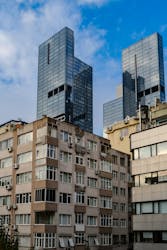Your Comprehensive Resource for Navigating Taiwan’s Rental Market
For foreigners coming to Taiwan to work or study, finding suitable accommodation is an important first step. By grasping some basic knowledge, it’s possible to successfully find ideal housing in Taiwan’s rental market.
Popular Rental Websites
The internet is the most common channel for rental searches. Popular rental websites include 591, HouseFun, Rakuya, etc. These sites collect rental listings from all over Taiwan, allowing for convenient searches and comparisons.
Rental Terminology
Short-term: Properties rented for shorter periods, with rent typically calculated monthly or weekly. Leases less than 1 year.
Long-term: Rental periods from 1 year up to several years.
Studio Apartment(套房): A self-contained unit with a private room and bathroom, but not necessarily a kitchen.
A room in a shared apartment (雅房): A single rented room within a shared apartment unit, with a communal bathroom and living spaces.
Apartment (公寓): Typically low-rise buildings from 2-5 floors with multiple independent units. Apartments contain separate bedrooms, bathrooms, living room, and kitchen. May or may not include parking. Note any amenities like elevators, security, garbage disposal, and if utility fees are included or separate.
Condo/High-rise (大廈/電梯大樓的公寓): Modern multi-story residential buildings with elevators, security, garbage facilities. Generally better security and amenities than older complexes, with higher rents. Utility fees may be included or billed separately based on the agreement.
Leasing and Payments
Signing a lease contract is required, with standardized forms provided by landlords covering rental period, rent, deposit, utility breakdowns, etc.
When signing, expect to pay the first month’s rent plus a 2-month deposit as security for damages or unpaid rent. Deposits range from 1-3 months’ rent, with 2 months being typical. For example, if rent is NT$15,000 with a 2-month deposit, you’ll pay NT$45,000 upfront (first month’s rent plus deposit).
Rent and deposits are usually paid in cash or bank transfer. During the lease, rent must be paid on time by the agreed date, e.g. before the 5th or 10th of each month. Pay 1-2 days in advance to avoid late fees.
If there’s no damage, the full deposit is refunded when moving out. Otherwise, repair costs are deducted from the deposit.
Furniture and Renovations
Many rental units in Taiwan come partially or fully furnished. Clarify furniture needs beforehand so the landlord can remove unwanted items before move-in. Some landlords are reluctant to remove large furniture for short-term rentals under 1 year, in which case you may need to find another unit.
Do not make unauthorized renovations like drilling holes or hanging items. Any planned renovations require explicit landlord approval first. Some may allow minor, non-damaging changes like painting, while others prohibit all work. Communicate clearly beforehand.
Utilities and Facilities
For studios/rooms in a shared apartment, landlords often have their own utility billing methods like pro-rated charges or flat fees. Evaluate if these are reasonable.
Pets Require Approval
Do not keep pets in the rental unit without the landlord’s prior permission, as this could be grounds for eviction. Before signing, confirm if pets are allowed, which types, and any limitations. Please note smaller pets such as birds, hamsters, fish, turtles, or other small rodents are fine. Cats and dogs are the pets that spark issues because of the fur, noise, and urination on the floors.
Cultural Differences
In older buildings, avoid flushing toilet paper as plumbing can’t handle it. Most rules prohibit indoor smoking or loud noises disturbing neighbors. In buildings with recycling facilities, follow waste sorting guidelines.
Some landlords may be hesitant to rent to foreigners due to cultural differences or past negative experiences. As foreign tenants, demonstrating good conduct can build landlords’ trust for future overseas renters.
With proper preparation, understanding the basics and legal knowledge, and clear communication with landlords, foreigners can absolutely find ideal, safe housing in Taiwan. Even locals face a learning curve, so don’t hesitate to seek advice from local friends or community groups if needed.
How about renting a place through a real estate agent? Let’s learn about it here!


